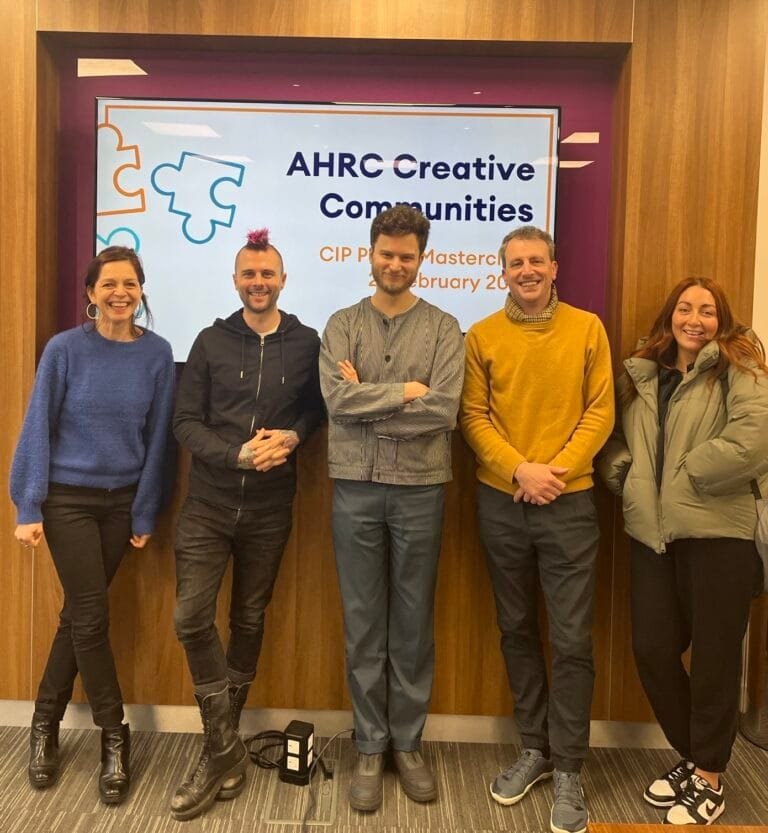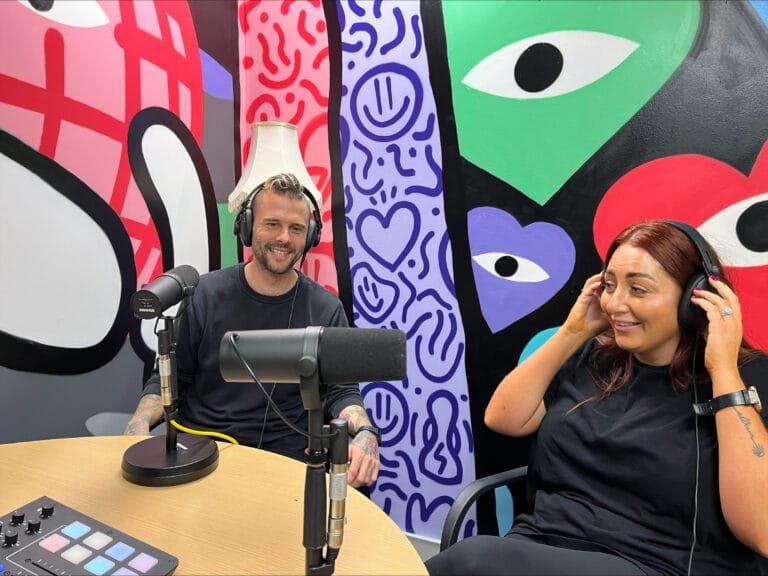
In a rapidly evolving world, the ability of cross-sector partners to share knowledge and collaborate effectively is essential for driving innovation and change. Communities of practice - groups of people who share a common interest or field of expertise - play a vital role in facilitating co-creation, knowledge exchange and fostering a sense of belonging. By providing a platform for individuals to connect, learn from one another, and develop shared skills, communities of practice can empower individuals and organisations to discover untapped knowledge, identify common challenges and opportunities, and realise their goals.
The AHRC Creative Communities programme is a £3.9m investment hosted by Northumbria University generating a new evidence base for the value and impact of cross-sector co-created culture-led R&D with communities across devolved contexts in all 4 nations of the UK.
The programme examines the delivery model of a ‘creative community’ – collaborative cross-sector R&D that brings together diverse actors from community, government, education, arm’s length, third and private sector organisations to deliver new culture and generate economic, social and cultural value.
Since 2022, our research has explored the potential of co-created culture and R&D to enhance belonging, address regional inequality, deliver devolution, and break down barriers to opportunity for communities using the new policy levers available in devolved settings.
In May 2023 we delivered ‘By All, For All: The Power of Partnerships’, a deep dive report drawing on more than a decade of AHRC-funded community and cross-sector collaborative R&D to explore how we can unlock the potential of engaging communities and partners as researchers.
Learning from the deep-dive report was used to develop the Community Innovation Practitioner (CIP) Awards 2023/2024, a pilot award funding five CIPs from across the four nations of the UK to capture learning and outputs from new co-creation processes in collaborative cross-sector research in devolved policy making contexts.
Our research shows that fostering growth and progress within creative communities can often be stymied by a range of challenges. To respond to this, we built in mechanisms for the CIP Awards that address these challenges and amplify the impact of possible solutions. A key element of the CIP Awards was the CIP Network: a community of practice that would foster new relationships between the CIP cohort, the Creative Communities team, and our wider network of cross-sector partners. The CIP Network met monthly across the duration of the awards and provided a platform for knowledge exchange, skill development, and solidarity in catalysing collective forms of action, as well as a space for wrap-around skills development.
In-person events at the beginning and mid-point of the year-long CIP awards brought the CIP cohort together physically, introduced them to the Creative Communities team and the core aspects of the programme, as well as the funders AHRC. Regular online 1-1 mentoring sessions and open office online drop in sessions provided space for CIPs to share their progress. Dedicated skills sessions provided monthly guest speaker slots from beyond the confines of academia. The CIPs also received invitations to our UK-wide Policy Labs - where experimental creative facilitation methods were used to unite diverse stakeholders and generate new policy solution suggestions - to help link their work to new policy-informed networks, as well as generating new co-created policy ideas.
The most powerful element of the CIP Awards was the podcast training and co-creation that was delivered by Vic Turnbull of MIC Media. Across 7 training and co-creation sessions, the CIPs worked closely with Vic and the Creative Communities team to develop their podcasting skills and create a plan for their individual podcast episode. This was a new domain for many of the CIPs, but also the Creative Communities team: it was a journey of professional development that we undertook together.
Podcasting offers a powerful platform and means of communication for research and researchers. Embedding podcast training and producing a 5-part podcast series in the CIP Awards created research outputs that captured the multiplicity of voices involved in research and not just the single voice of the researcher. Beyond this, it also became a vital tool for connection for the CIPs and the Creative Communities team. The CIPs got to know each other’s work in-depth and were able to recognise points of difference as well as similarities, especially when sharing details about the unique devolved contexts in which each of their communities were located. But don’t just take my word for it – here’s CIP Georgina Aasgaard to share more:

My CIP research in Health and Wellbeing explores how music collaboration and co-creation can support people facing mental health challenges in local communities in Liverpool. Before my CIP research, I participated in podcasts that were conversational, but creating the Creative Communities podcast was a new and unique research process. Through training and co-creation with Mic Media, we meticulously planned episodes, selecting interviews, music, and sounds to amplify partners’ voices and bring their stories to life.
This podcasting method gave me a foundation and inspiration to create more podcasts, not only as a communication tool but as an essential research method. The process enabled me to develop more awareness and understanding of people’s needs. In Health and Wellbeing, podcasts have the power to break stigma through sharing stories, expertise and insights. This creative platform is highly needed to genuinely listen, connect and engage with partners and local communities as collaborators, fostering personal and community growth while advancing critical research.
---
Building communities of practice for culture-led, co-created R&D are essential for fostering knowledge sharing, collaboration, and more inclusive forms of innovation. By providing a platform for the CIP cohort to connect, learn from one another, and develop shared skills, Creative Communities and the CIP Awards have been able to enhance CIPs co-creation capacity and skillset, connecting them to a wider network of peers working to empower individuals and organisations to reach shared goals. As we continue to navigate an increasingly complex and interconnected world, the importance of building and nurturing creative communities – and sharing learning on the practices and policies that come from them - will only grow.
The research from the Community Innovation Practitioner (CIP) Awards 2023/24 can be found on the Creative Communities website, including case studies, policy papers, and the Creative Communities podcast. We are delighted to launch a scale up of the Community Innovation Practitioner (CIP) Awards for 2025/2026, doubling the number of opportunities for new CIPs. A call is open until 6th January 2025 for expressions of interest for up to 10 Community Innovation Practitioners with the commitment to have at least one award in each of the four nations of the UK. The Creative Communities team will hold a webinar to discuss this funding opportunity and answer questions on 13 November 2024 at 11am (UK time). You can register for the webinar via Teams Events.
Authors:
Dr Lauren Baker Mitchell, Senior Research Fellow for AHRC Creative Communities, Northumbria University
Georgina Aasgaard, Community Innovation Practitioner 2023-24, University of Liverpool
Top Image: CIPS at the in-person Midpoint meeting in Leeds, February 2024. Image credit: Lauren Baker Mitchell
Middle Image: CIPs Jim Donghey and Aine Brady in Northumbria University podcasting booth at the in-person Welcome Event in Newcastle, October 2023. Image credit: Lauren Baker Mitchell
